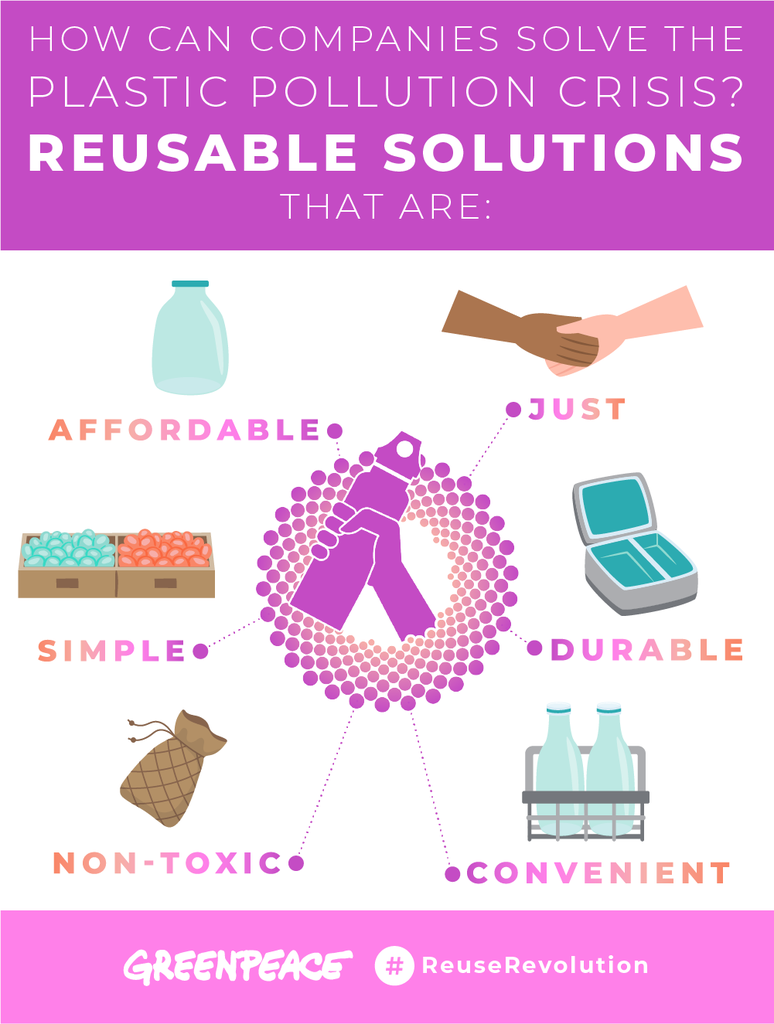Over 200,000 people have joined Greenpeace’s call for Canada’s big supermarket chains to start dealing with their massive plastic and packaging problem. Our petition numbers keep growing, while conversations online, in our communities and in the media continue to highlight the urgent need for change in our grocery carts, and our oceans. What’s also clear is people’s disappointment in how supermarkets are responding…or aren’t responding.
Surveys, public polls and scrolling through comments on various news articles all reveal the same thing – ditching single-use plastics is a must and alternatives are long overdue. The overarching message to companies has been clear: commit to ditch single-use plastics and disposable packaging and offer better alternatives for customers, and our planet.
Unfortunately, retailers have yet to answer with meaningful action.
We’ve seen announcements about reduction efforts with no baseline, clear targets or milestones. And vows to remove plastic bags, but no larger reduction approach. Customers are now allowed to bring their own containers in various stores, but it’s not consistent across chains. And no reusable or refillable packaging goals have been set that isn’t about putting the onus on the customer. We have heard about a reusable packaging trial, but with lacking details.
While we’re left with more questions than answers, that isn’t stopping a Reuse Revolution from igniting. Across Canada, and around the world, people are rejecting single-use plastics, our throwaway culture and, ultimately, the broken disposal obsessed system we are sold on a daily basis. From small acts of protest in bringing their own containers to a store or restaurant, to testing out zero waste grocers, these cumulative acts of support for reuse models are growing a movement determined to figure out a throwaway plastic free future.
Canada’s big supermarket chains could help lead this revolution, if they’d just commit to join it.
So, to Loblaw, Sobeys, Metro, Walmart, Costco, Overwaitea Food Group, Wholefoods, Longos and other supermarket chains: here’s how you can help fuel solutions, instead of tonnes of waste and devastating pollution.
1) Commit to ACTUAL reduction. Set plastic reduction targets and set a timeline for meeting them. Work towards a phase-out of all non-essential plastics and disposables. Non-essential means not used for medical or accessibility needs, or in a durable, reusable, long-life function. Start with the most problematic and unnecessary plastics like those that regularly end up as pollution, those that are known to be toxic, those that already have reusable alternatives, and those that are most often sent to landfill or incineration despite recyclability claims. Are we still talking about plastic bags? Really? Can something be unpackaged? Start now.
2) Rethink product delivery altogether.
- Embrace reuse, refill and bulk models. Lots of staple grocery items can come in bulk or refill format, or reusable packaging that could be returned. Many products don’t need their own portion-sized packaging. From flour to pasta, baked goods to granola bars, mylks to juice, somewhere right now it’s offered in bulk or reusable packaging. Start the transition by allowing customers to bring their own containers in every allowable context. Health and safety can be figured out, it’s 2019.
- Work with major brands, suppliers and peers on industry-wide, replicable models. Nestle, Procter and Gamble, Unilever, Coca-Cola, PepsiCo, and other suppliers of popular products are at the table, so work with them to innovate and pilot real solutions. Can the retail sector come together in a pre-competitive space? Reusable packaging/container/bag/shipping material shares? Be visionary and think to the future. The Reuse Revolution will succeed out of a crisis of necessity or out of proactive innovation, work to make it the latter.
3) Avoid False Solutions. Alternative bio-based disposable packaging and 100% recyclable or recycled content – same waste, different format. If it meets single-use needs, rethink it. The throwaway, linear model has gotten us here and only truly circular models will start to move us forward. Our Canadian recycling systems and waste management systems are broken, buckling under the pressure of over 3 million tonnes of plastic waste a year. Global recycling is also broken. Organic waste collection systems are not ready or able to absorb an onslaught of single-use content. And those bio-based sources could be better used. While you’re reading this, at least 3 garbage truck loads worth of plastic have entered our oceans, and tonnes of plastic has been sent to landfill. We can’t wait to bring our recycling rates from 9% up to 100%.
4) Be transparent in your reduction journey and ask for help. The only way for people to buy in to claims around reduction and a way forward is to know where you’re starting from. We know it’s bad, so you might as well be clear on the numbers. There are so many companies, communities and individuals with a breadth of knowledge. Seek them out and learn from their approach.
This should all fit within a robust plastic reduction and zero waste policy. While taking initial steps shows movement, a one-off to one-off approach won’t cut it.
And remember, just because a customer hasn’t sent a letter or complained directly to a store employee, it doesn’t mean they don’t care. They’ve told us they care, they’ve shared their frustration online. They’ve vented to their friends and family. We’ve all heard it.
Greenpeace has launched Global Refill Week, and will be joined by people who feel inspired to take their Reuse Revolution message directly to stores.
Let’s make a zero waste shopping experience accessible to all Canadians. Which of Canada’s biggest retailers will be the first to help make that happen?



Discussion
I'm still looking for the way to get those labels asking for bulk packaging, etc. I would love to get many of those
Hi Carmen, Good news! The placards are available for download now. Please check our latest Global Refill Week recap blog here: https://www.greenpeace.org/canada/en/story/27492/are-zero-waste-supermarkets-possible/ Thank you for your support!